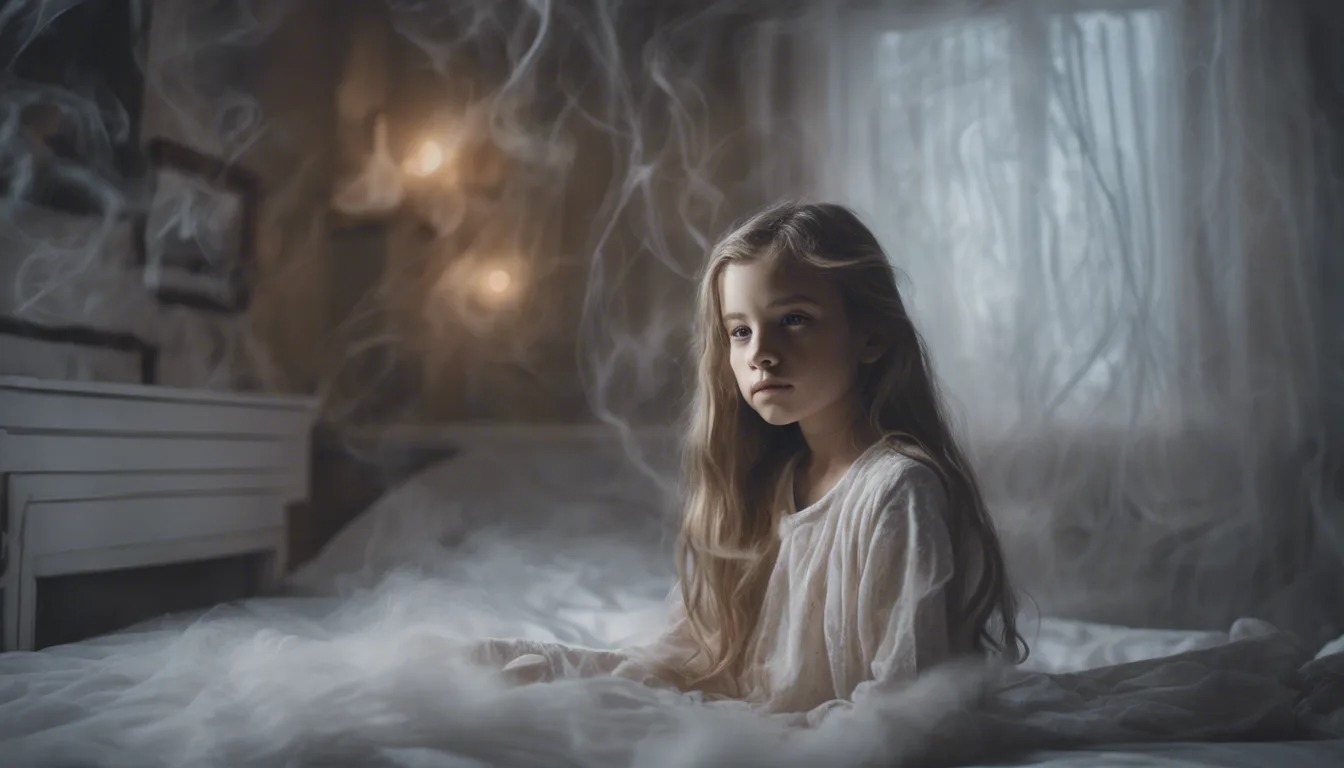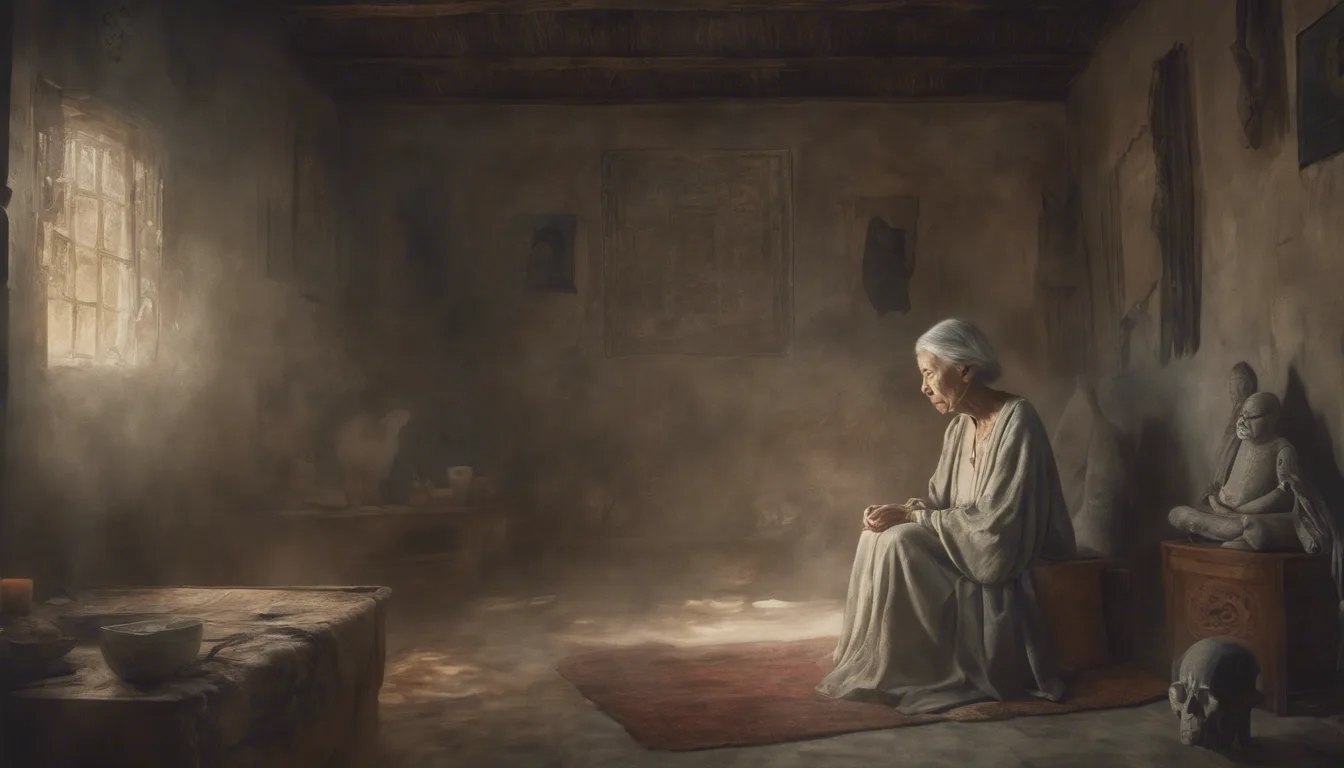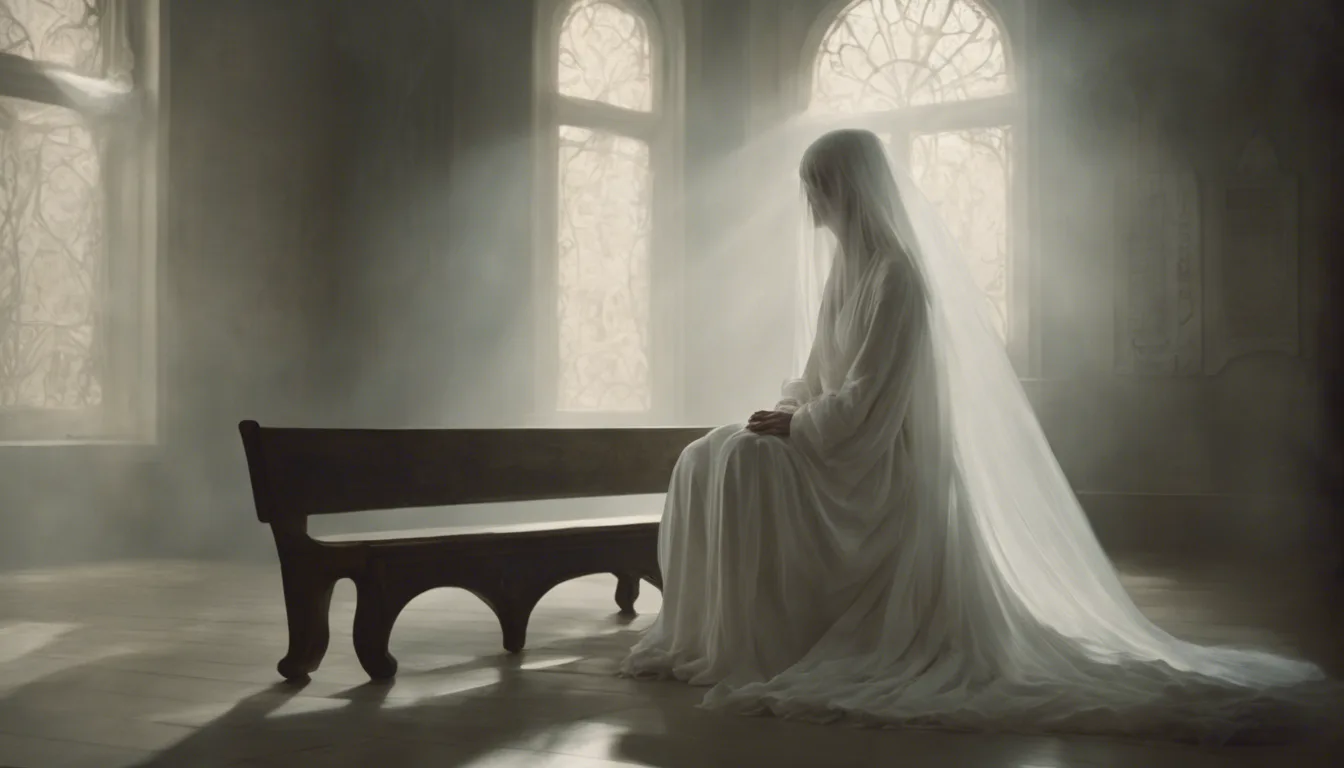13 Demographics of People Who Might Dream of Ghosts
Want a Personalized Dream Interpretation?
Curious about how people like you interpret this dream symbol? Explore personalized interpretations tailored to your demographic. Get personalized insights for free!
Get Free Interpretation Now →Table of Contents
1. Children and Adolescents
Children and adolescents often have dreams about ghosts. These dreams can be frightening, but they can also be exciting or even comforting. For many children and adolescents, ghosts represent the unknown and the mysterious. They can be a way of exploring fears and anxieties about death, loss, or change. Dreams about ghosts can also be a way of expressing creativity and imagination.

Children and adolescents who have dreams about ghosts may be trying to process difficult emotions or experiences. For example, a child who has recently lost a loved one may dream about that person as a ghost. This dream may be a way for the child to grieve and to come to terms with the loss.
Alternatively, a child or adolescent who is feeling anxious or stressed about a particular situation may dream about ghosts as a way of expressing those fears. Dreams about ghosts can also be a sign of creativity and imagination. Children and adolescents who are interested in fantasy and the supernatural may enjoy dreaming about ghosts. These dreams can be a way for them to explore their creativity and to express their unique perspectives on the world.
If you are a child or adolescent who has dreams about ghosts, it is important to talk to a trusted adult about them. This can help you to understand what the dreams mean and to develop strategies for coping with any difficult emotions that they may be causing.
2. Adults
- These dreams can be a way for adults to explore their fears, anxieties, or regrets.
3. Elderly
- Exploration of the Past: For elderly individuals, dreaming of ghosts may symbolize their reflection on the past, revisiting memories and life experiences. It could represent a desire to reconnect with loved ones who have passed away or to revisit significant moments in their lives. These dreams can evoke feelings of nostalgia, longing, and contemplation.

-
Fear of Death: For some elderly dreamers, ghosts may represent a fear of death or the unknown. They may be grappling with the inevitability of their own mortality and the uncertainty of what lies beyond life. Dreams about ghosts can be a way for them to confront these fears and explore their feelings about death and the afterlife.
-
Unresolved Issues: Ghosts in dreams can sometimes symbolize unresolved issues or conflicts from the past that continue to haunt the dreamer. These dreams may be a way for the elderly to process and come to terms with past experiences, regrets, or unresolved relationships. By confronting these ghosts in their dreams, they can gain a new perspective and find closure.
-
Cultural and Spiritual Beliefs: Cultural and spiritual beliefs can also influence the meaning of ghost dreams among the elderly. In some cultures, ghosts are believed to be spirits of the dead who have unfinished business or messages to convey. Dreams about ghosts may be seen as a way for the deceased to communicate with the living or to provide guidance and support.
4. Men
- For men, dreams about ghosts can often be interpreted as a sign of unresolved issues from the past.
5. Women
-
Dreaming of ghosts often evokes a range of emotions, from fear and anxiety to curiosity and intrigue. For women, ghost dreams can hold unique significance and offer insights into their inner thoughts and feelings.
-
Ghosts in dreams can represent unresolved emotional issues from the past. They may symbolize a haunting memory, a lingering regret, or a relationship that remains emotionally unresolved.
-
Dreams of being chased by ghosts can signify feelings of guilt or shame. These dreams may suggest that the dreamer is avoiding confronting a difficult situation or issue in their waking life.
-
Conversely, dreaming of friendly or helpful ghosts can represent guidance and support. These dreams may appear during times of transition or uncertainty, offering the dreamer a sense of comfort and reassurance.
-
Women who experience recurring ghost dreams may find it helpful to explore the underlying emotions and associations connected to these dreams. Keeping a dream journal and reflecting on the details of these dreams can provide valuable insights into the dreamer's inner world.
-
Seeking professional help may be beneficial if ghost dreams are causing significant distress or interfering with daily life. A therapist can help the dreamer explore the underlying reasons for these dreams and develop strategies for coping with them.
6. Pregnant Women
-
Ghostly Messengers: Pregnant women often perceive ghosts in dreams as messengers from beyond. These ethereal figures may represent a connection to the spirit world or a way for the subconscious to communicate significant messages or guidance during this transformative journey.
-
Fears and Anxieties: The presence of ghosts in a pregnant woman's dream could stem from underlying fears and anxieties surrounding pregnancy, childbirth, or the future. Ghosts can embody these apprehensions, mirroring the emotional turmoil and uncertainty that often accompany this phase of life.
-
Guardian Angels: Some pregnant women see ghosts as protective figures, acting as guardian angels who watch over them and their unborn child. These ghosts may represent a sense of safety, comfort, and reassurance during a time of significant physical and emotional change.
-
Ancestral Connections: Dreams of ghosts can also symbolize a connection to one's ancestors. Pregnant women may encounter ghosts who resemble deceased family members, representing a sense of lineage and continuity. These dreams can offer a sense of belonging and remind the dreamer of the strength and wisdom inherited from those who came before.
-
Reflections of the Past: Ghosts in dreams can sometimes serve as reflections of past experiences, unresolved issues, or lingering emotions. Pregnant women may encounter ghosts that represent aspects of their past that they need to confront or process in order to move forward with their pregnancy and motherhood journey.
7. People with Mental Health Disorders
- For individuals with mental health disorders, dreams about ghosts can hold profound significance and offer valuable insights into their inner struggles and emotional states.

-
Their dreams may feature ghosts as metaphors for unresolved trauma, repressed emotions, or dissociated aspects of the self, providing a symbolic representation of their psychological distress.
-
The nature of the interaction with the ghost in the dream can shed light on the dreamer's relationship with their inner turmoil.
-
For instance, feeling pursued or threatened by a ghost could symbolize an overwhelming sense of fear or anxiety, while engaging in a dialogue with a ghost could represent an attempt to confront and understand their inner conflicts.
-
Dreams about ghosts can also serve as a coping mechanism, allowing individuals with mental health disorders to process and integrate difficult emotions in a safe and symbolic space.
-
By exploring the symbolism and context of these dreams, therapists and mental health professionals can gain valuable insights into the client's subjective experience, facilitating a deeper understanding of their condition and aiding in the development of effective treatment strategies.
8. People who have experienced trauma
-
For individuals who have endured trauma, ghostly figures in dreams may reflect lingering fears, unresolved emotions, or a sense of unfinished business related to the traumatic event.
-
The dream ghost might represent aspects of the trauma that the person is struggling to confront or come to terms with. It could symbolize buried memories, repressed emotions, or the ongoing impact of the trauma on their life.
-
Alternatively, the ghost may embody the person's feelings of guilt, shame, or responsibility associated with the traumatic experience. It could serve as a reminder of past mistakes or missed opportunities, leading to feelings of remorse or regret.
-
In some cases, the ghost may represent a deceased loved one who was connected to the traumatic event. The dream could be a way for the person to process their grief, unresolved emotions, or longing for the lost individual.
-
Additionally, the ghost may symbolize the person's attempts to escape or avoid dealing with the trauma. It could represent their desire to bury the past and move on, even if it means suppressing important emotions or memories.
9. People who are grieving
Demographic: People Who Are Grieving
For those who are grieving, dreams of ghosts can be a way of processing and coming to terms with their loss. The ghost may represent the deceased loved one, or it may symbolize the emotions that the dreamer is experiencing, such as sadness, anger, or guilt.
Dreams of ghosts can also be a way for the dreamer to say goodbye to their loved one. In these dreams, the ghost may appear to say things that the dreamer was never able to say in real life. This can be a healing experience for the dreamer, as it can help them to find closure and move on with their life.
Of course, not all dreams of ghosts are positive. For some people, these dreams can be frightening or disturbing. This is especially true if the ghost is depicted as being angry or malevolent. These dreams may be a sign that the dreamer is struggling to cope with their grief and may need additional support.
If you are grieving and you have been having dreams of ghosts, it is important to talk to a therapist or counselor. They can help you to understand your dreams and find ways to cope with your grief.
Here are some specific examples of how dreams of ghosts can be interpreted in the context of grief:
-
Dreaming of a deceased loved one who is smiling and happy may be a sign that the dreamer is coming to terms with their loss and is beginning to heal.
-
Dreaming of a deceased loved one who is angry or sad may be a sign that the dreamer is still struggling to cope with their grief and may need additional support.
-
Dreaming of a ghost that is trying to harm the dreamer may be a sign that the dreamer is feeling guilty about something they did or didn't do in relation to the deceased loved one.
-
Dreaming of a ghost that is trying to help the dreamer may be a sign that the dreamer is receiving support from the deceased loved one in the afterlife.
10. People who are stressed or anxious
People Who Are Stressed or Anxious
-
Cause: Ghosts often appear in dreams as a manifestation of repressed fears, anxieties, or unresolved issues. When a person is stressed or anxious, their subconscious mind may use dreams as a way to process and cope with these negative emotions.
-
Symbolism: In dreams, ghosts can symbolize a variety of things, including:
- Fear of the unknown
- Anxiety about death or dying
- Guilt or shame over past actions
- Unresolved conflicts or issues with others
- Feeling haunted by memories or experiences
-
Interpretation: When interpreting dreams about ghosts, it is important to consider the context of the dream, as well as the dreamer's individual life experiences and beliefs. For example, a dream about being chased by a ghost may represent a fear of being overwhelmed by negative emotions or circumstances. Alternatively, a dream about seeing a ghost in a familiar place may indicate that the dreamer is struggling to come to terms with a past event or relationship.
-
Possible Actions: If you are having dreams about ghosts, there are a few things you can do to try to understand and resolve their meaning:
- Keep a dream journal to record your dreams and any thoughts or emotions you have about them.
- Talk to a therapist or counselor to help you process your fears and anxieties.
- Engage in self-care activities such as meditation, yoga, or exercise to help reduce stress and promote relaxation.
- Consider making changes in your life to address the root causes of your stress or anxiety.
11. People who are creative or artistic
-
For creative or artistic people, dreams involving ghosts often symbolize untapped potential, hidden talents, and unexplored depths of their imagination.
-
These dreams could be a gentle reminder to embrace their creativity, take risks, and explore new avenues of expression.
-
Ghosts in dreams could represent aspects of the dreamer's personality that they may be suppressing or neglecting.
-
Unresolved emotions, past experiences, or forgotten memories could manifest as ghosts, urging the dreamer to confront and acknowledge them.
-
Creative individuals may find that their dreams of ghosts are a source of inspiration, providing them with fresh ideas and perspectives for their artistic endeavors.
12. People who are spiritual or religious
-
For people who are spiritual or religious, ghosts in dreams can carry significant spiritual or religious connotations. Dreams of ghosts may be seen as a way for the divine to communicate with a dreamer, or as a way for the dreamer to connect with their ancestors or departed loved ones. Dreams of ghosts may also be interpreted as a way of addressing the dreamer's spiritual concerns or anxieties.
-
Religious beliefs and spiritual practices can greatly influence the interpretation of ghost dreams. For example, a person who believes in reincarnation may interpret a dream about a ghost as a sign that a deceased loved one has returned in a new form. Alternatively, a person who believes in the existence of evil spirits may interpret a dream about a ghost as a warning of impending danger.
-
Cultural and societal factors can also influence the interpretation of ghost dreams. In some cultures, ghosts are seen as benevolent and harmless, while in others they are seen as malevolent and dangerous. The way that a person interprets a dream about a ghost may be influenced by their cultural beliefs and values.
-
Personal experiences and beliefs can also shape the interpretation of ghost dreams. For example, a person who has experienced the death of a loved one may be more likely to interpret a dream about a ghost as a sign from the deceased. Similarly, a person who has a strong belief in the afterlife may be more likely to interpret a dream about a ghost as a glimpse of the spiritual realm.
13. People who have had near-death experiences
-
In the realm of dreams, ghosts often appear as ethereal figures, veiled in mystery and intrigue. For individuals who have experienced the profound threshold of a near-death experience (NDE), dreams featuring ghosts can hold unique significance and offer glimpses into their transformed perspectives.
-
The presence of ghosts in dreams might symbolize a spiritual awakening, a heightened awareness of the interconnectedness of life and death. These dreams may serve as a reminder that our existence extends beyond the physical realm, fostering a sense of awe and reverence for the enigmatic forces that govern the universe.
-
Moreover, ghosts in dreams can personify unresolved emotions, regrets, or unfinished business from the dreamer's past. These apparitions may represent aspects of oneself that have been suppressed or ignored, urging the dreamer to confront and heal their inner wounds. By acknowledging and integrating these unresolved issues, individuals can embark on a journey of personal growth and emotional liberation.
-
In some instances, dreams of ghosts may reflect a longing for connection with deceased loved ones. The appearance of a ghost in a dream can provide comfort, offering a symbolic reunion and a chance to communicate with those who have passed on. These dreams can serve as a bridge between the physical and spiritual realms, facilitating healing and acceptance of loss.
-
It's noteworthy that the interpretation of dreams involving ghosts is highly subjective and influenced by individual beliefs, cultural context, and personal experiences. Exploring these dreams within the framework of a person's NDE can provide valuable insights into their spiritual journey and the profound impact it has had on their perception of life, death, and the interconnectedness of all beings.
Back to interpretation of ghosts